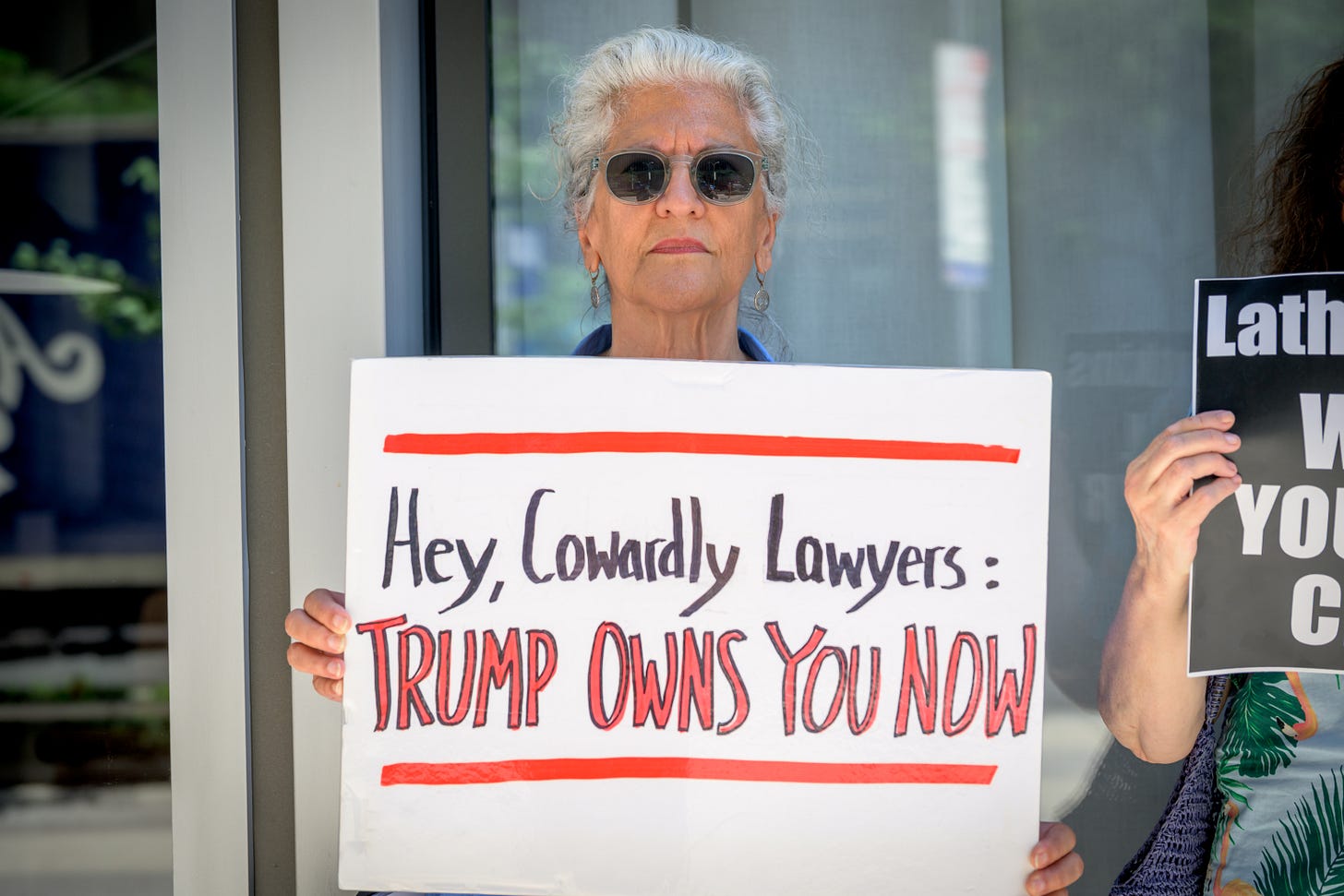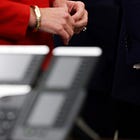The lawyers who caved
Big Law firms finally have to hold up their end of a Trumpian bargain.

A note from Aaron: ABC’s craven decision to pull Jimmy Kimmel’s show represents a major victory for MAGA in its war on free speech. In a climate where corporate media keeps obeying in advance and bending the knee to Trumpism, supporting independent media is more important than ever. If you value this newsletter — and I’m very proud of the quality explanatory journalism we do day in and day out — then please support our work by signing up for a paid subscription. Public Notice is made possible by readers like you.
The law firms that capitulated to Trump are finally having to make good on their deal with the devil.
Back in March, when Trump first began to issue executive orders punishing law firms for associating with his personal enemies, it is likely that some of the firms yet to be targeted thought that they could avoid a similar fate. That’s probably what motivated 11 of the most prominent law firms in the country to seek out Trump and make deals with him despite the PR backlash that they suffered for doing so.
But for 10 of these 11 firms, these deals were preemptive — they were trying to stop something that hadn’t yet happened — which meant the deals they entered into were vague to the point of being nonsensical.
For example, when Congress pressed the firms for the details, one of them (Milbank) just told Congress to go look at “an internal email to firm personnel” that had been reprinted in a legal industry trade magazine behind a paywall — not exactly the response of a confident party. Another firm (A&O Shearman) quite literally told Congress that their entire deal consisted of what Trump had posted on social media — hardly a model of lawyerly thoroughness.
Presumably, the capitulating firms were hoping that these deals would prevent the same revocation of security clearances and cancellation of federal contracts that Trump had already leveled at other firms. But none of that was included in the vague contents of the deals, leaving it entirely unclear what these law firms were getting out of exchange.
What was clearer was what Trump was getting out of it: namely, an open-ended promise from the capitulating law firms to do away with their DEI initiatives and devote hundreds of millions of dollars in pro bono services (aka services free of charge) to causes of his choosing.
In short: 11 of the most powerful and supposedly capable law firms in the country all made deals with Trump to do exactly what he wanted in exchange for almost nothing at all.
Submitting without a fight
These firms seemed to think that the vagueness of these deals was the very thing that would protect them.
For instance, the firm Simpson Thacher tried to tell Congress that the deal “does not dictate or restrict what pro bono matters we will take on moving forward,” while the firm Latham & Watkins said it “maintains its complete independence as to the clients and matters the firm takes on.” And they stuck to this line despite the entire free-thinking public pointing out that the vagueness was precisely what would allow Trump to use the tremendous resources of these firms to do whatever he wanted — and despite Trump himself explicitly saying that he was going to use these firms to defend police officers accused of misconduct and help him in his ongoing trade war.
Now, to no one’s surprise except their own, it looks like the capitulating firms are finally having to hold up their end of the bargain.
At least two of the law firms that made deals with Trump — Paul Weiss and Kirkland & Ellis — are currently “working on a range of matters for the Commerce Department” for free, including negotiating Trump’s trade deals just as he said that they would. Another firm, Skadden Arps, has been doing similar work for the Commerce Department and in relation to the government’s investment in Intel — though it is unconfirmed if it is part of their comparable deal with Trump or just independently bad decision-making on their part.
Paul Weiss had earlier said that its only deal commitments were to “assist our nation's veterans, to combat anti-Semitism, and to promote the fairness of the justice system,” while Kirkland & Ellis had said that it only committed to provide “services on a non-partisan basis to a wide range of underserved populations.” Apparently this now includes negotiating tariffs for the Commerce Department.
And this is just the work that has accidentally become public at this point. Neither Trump nor the capitulating law firms are under any obligation to announce when one of these law firms contributes its services in accordance with their deals. This likely means that this is just the beginning — both in terms of the types of work that these firms will be doing to hold up their end of the bargain, and in terms of how many of these 11 capitulating firms will be doing this work.
It is worth pausing here to contextualize just how extraordinary this all is. Big Law firms have never before done free work for a sitting president, let alone “pro bono” work, which the American Bar Association generally defines to mean work that is “designed primarily to address the needs of persons of limited means.”
Moreover, these are some of the most powerful and capable law firms in the country. Skadden Arps is ranked as the third-most prestigious firm in the US, while Kirkland & Ellis is the single largest firm in the US by revenue, earning nearly $9 billion in 2024.
And yet Trump now has a promise from these firms and their compatriots to spend nearly a billion dollars of their services — which, at an average hourly rate of $1,000 an hour, works out to roughly a million hours of attorney time — on basically whatever he wants.
This is, plainly put, an affront to the rule of law. By attacking not only the people he doesn’t like, but the lawyers who represent them, Trump has made crystal clear that he does not think his opponents deserve the same legal rights as his allies. This erodes a bedrock of the American legal system: the notion that everyone has the same rights. By entering into these deals, these law firms have helped Trump to chip away at that notion and become complicit in his attack on our legal system.
For that complicity to come from these law firms is nothing short of shocking. They consist of the highest-paid, most well-resourced, and arguably best lawyers in the country. They pride themselves on winning the hardest legal fights in the world, and many of them expressly specialize in exactly the kinds of issues that are at stake in this fight.
In other words: these law firms are the exact set of people who are most capable of winning against Trump — and yet they chose to give up without a fight.
Complicity
Part of what makes these firms’ capitulation so frustrating is that they could have won easily. For proof, look no farther than the four law firms that chose to fight back —WilmerHale (my former firm), Jenner & Block, Perkins Coie, and Susman Godfrey — all of whom didn’t just win but crushed the Trump administration in court.
For instance, the judge in one of the cases wrote that “in the nearly 250 years since the Constitution was adopted no Executive Order has been issued challenging these fundamental rights,” meaning that “this Order must be struck down in its entirety as unconstitutional. Indeed, to rule otherwise would be unfaithful to the judgment and vision of the Founding Fathers!” (Exclamation point included.)
Another judge quoted Shakespeare to compare Trump to historical villains and then said “The importance of independent lawyers to ensuring the American judicial system’s fair and impartial administration of justice has been recognized in this country since its founding era ... the instant case presents an unprecedented attack on these foundational principles” and “cannot be allowed to stand.”
In other words: it was not a close call.
Perhaps because of this, the capitulating firms have suffered tremendous blows to their reputations. In addition to the aforementioned congressional inquiry, the capitulating firms have seen major clients flee for firms that are more willing to fight, efforts by law students to starve the capitulating firms of their access to talent, a major exodus of their own lawyers — many of whom have publicly denounced the firms on their way out — and the founding of new firms expressly devoted to taking up the fight that they would not.
Through all of this public shaming, the one thing that the firms had to console themselves with was their belief that they weren’t actually going to have to do anything to make good on their deals — a belief that is now being very publicly shattered.
This will likely degrade their reputations even further — as it should. These firms are complicit in aiding one of the most serious attacks on the rule of law in the US to date, and that complicity casts serious doubts not only on their commitment to their own profession, but on the efficacy of their legal representation on behalf of their clients.
It also raises serious questions about the ecosystem of lawyers and legal training in the US as a whole. After all, these are supposedly the very best lawyers in the country, all of whom graduated near the top of their class from the best law schools. If these shining stars of the legal profession are willing to betray the very legal system that gives them their value at the mere possibility of a pay cut, one has to ask: is that system really working the way that it should?
It will likely be a long time before there is a good answer to that question, which will depend in part on exactly what these law firms do next. But in the meantime, we can at least content ourselves with the spectacle of these formerly sparkling firms serving as very public demonstrations of one of the oldest adages in the book — that crime does not, in fact, pay.
Matthew Wollin is a former Big Law lawyer turned legal journalist. He's written for Mother Jones, Newsweek, Slate, and The New Republic. His Substack Should You Care? helps make sense of legal issues for non-lawyers and answer this never-ending news cycle's eternal question: should you care?
That’s it for today
We’ll be back with more tomorrow. If you appreciate today’s PN, please do your part to keep us free by signing up for a paid subscription.
Thanks for reading, and for your support.






Thank you for this sharp and necessary piece. It’s astonishing how quickly these firms surrendered; not just their principles, but their leverage.
I write about this kind of institutional capitulation often — how power reshapes speech, how legal and financial systems quietly enable authoritarian drift. What’s happening here isn’t just about lawyers. It’s about the machinery of compliance dressed up as professionalism.
There’s a reason I don’t place much faith in legal institutions. Too often, they follow power, not justice, especially when the incentives are financial.
This moment demands clarity, not cleverness. And your reporting helps cut through the fog.
Thank you.
— Johan
Professor of Behavioral Science
Matthew, thank you for highlighting these facts and for drawing attention to these deals on the heels of the filing of Trump's absurd lawsuit against more members of the press. My legal analysis of that the complaint in that lawsuit is that it wasn't even intended--by Trump or his lawyers--to prevail in a court of law under the governing law. As far as I could ascertain, Trump and his lawyers used that lawsuit for outright open and notorious extortion--much like Trump and his lawyers used other lawsuits previously.
The lack of details of the deals with law firms is more evidence that Trump is abusing his position as a purported public servant to shake down businesses. Trump has essentially turned the US government into the O in RICO. It seems that even was his point in laying off or firing all the people who lost their jobs because of Trump.